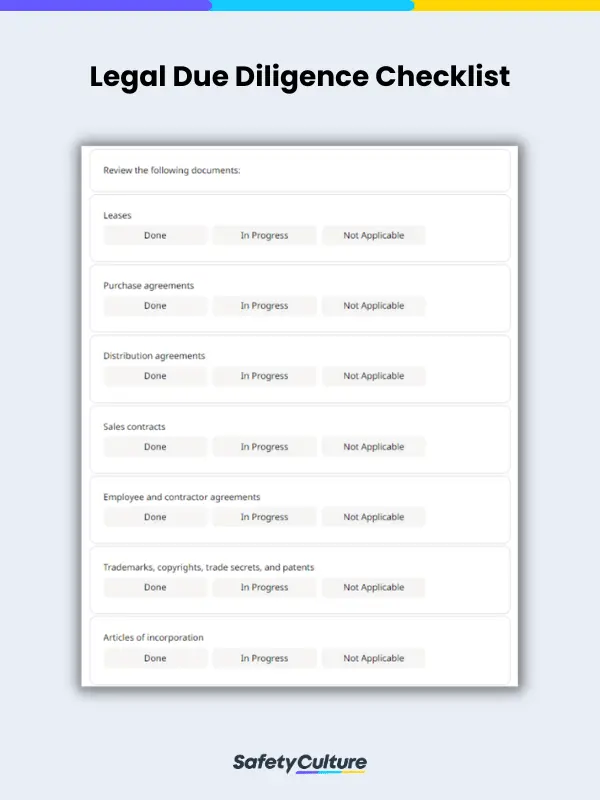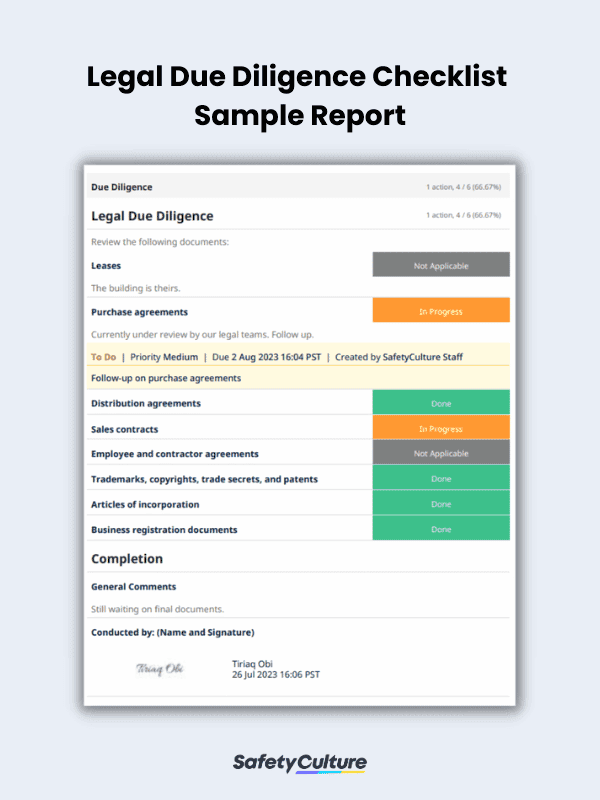What is a Legal Due Diligence Checklist?
A legal due diligence checklist is a document that businesses can use to perform a due diligence inspection before buying and selling businesses amongst themselves. It details the key legal factors to look out for, risks, and other important information.
What is the Purpose of Legal Due Diligence?
Due diligence refers to the act of collecting and analyzing information before making a final decision. In the world of business, the main purpose of legal due diligence is to ensure both buyer and seller are aware of any legal technicalities or issues before proceeding with their transaction. Performing a legal due diligence inspection helps identify potential issues that can come up later once a sale has been made, how to factor them into the final decision-making process, and if any changes need to be made before then.
However, performing this due diligence inspection is a long process that will require many people to be involved, hence the need for a legal due diligence checklist. With a dedicated checklist for managing due diligence activities, you can ensure that no important step is missed and that all standards are complied with before you and all other parties make a decision to buy or sell.
What to Include in a Legal Due Diligence Checklist
Different businesses in different industries will have different ways of creating and using a legal due diligence checklist. Each country also has a different culture of legal due diligence. Hence, there can be many ways to create and perform this task.
However, in most cases, legal due diligence checklists cover the same things across industries, requiring you to inspect the essential things related to buying and selling a business. A typical checklist will include sections for you to examine the following:
- Leases and related history
- Purchase agreements
- Distribution agreements
- Sales contracts and past sales
- Employee agreements and contractor agreements, if applicable
- Trademarks, copyrights, and patents
- Articles of incorporation
- Business registration documents
Ideally, at the end of your legal due diligence checklist, you also have a section for additional general comments and sign-off. Creating a separate section for comments, tasks, and findings helps streamline your inspection more efficiently. Additionally, requiring a sign-off section ensures the validity of the inspection.
Here is a sample digital legal due diligence checklist template in use:
Going digital would also be the best way to create and manage a legal due diligence checklist. Not only does going digital reduce paper waste and the need for additional physical storage space, but it also makes performing any due diligence easier. A study shows that following the COVID-19 global pandemic and the rise in technological advancements, 64% of lawyers in the European region, Middle East, and Africa believe digitizing different processes can reduce the time it takes to perform legal due diligence to one month by 2025.
In addition, using a digital legal due diligence checklist that can be accessed anytime and anywhere can make your inspection process more efficient, as it allows you and other staff to work together no matter when and where. The right digital solution will also provide an extra layer of security to your checklists and reports, ensuring that only authorized personnel can access your files.
FAQs about Legal Due Diligence Checklists
Legal due diligence is usually carried out by qualified legal professionals internally and externally, including attorneys and corporate lawyers. Other staff such as department heads, HR professionals, quality managers, cybersecurity staff, and finance officers may be involved depending on your structure.
Legal due diligence is often used for the following situations:
- Mergers
- Acquisitions
- Investments
In some cases, it can also be used for internal needs such as:
- Onboarding and offboarding employees
- Solving disputes and ensuring agreements are met with contractual staff
- Addressing customer service issues
A typical due diligence check often lasts a few months. However, this can differ depending on the parties involved and what has been agreed upon. The time allotted for a legal due diligence check is often lengthy as there are many processes and people involved from all sides. There are also many different documents to review and approve during the process, which can be out of both the buyer’s and seller’s control depending on the situation.
With technology, however, all these processes can be sped up for a more efficient system.




